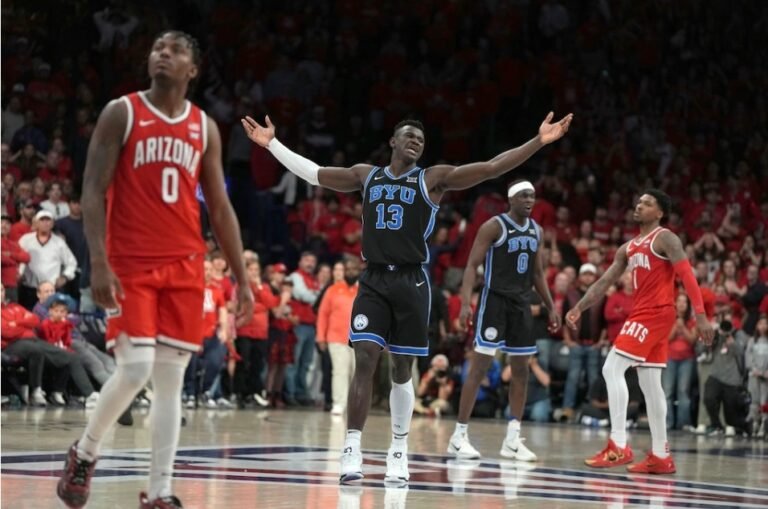In the heated atmosphere of a college basketball rivalry, the recent chants from Arizona fans aimed at Brigham Young University (BYU) fans following a BYU victory have sparked controversy and raised questions about sportsmanship and religious intolerance in collegiate athletics.
After a tense game in which BYU managed to secure a hard-fought victory over the University of Arizona, the stands erupted not just in celebration, but in something far more troubling. Arizona fans began chanting an anti-LDS (Latter-day Saint) taunt, mocking BYU’s religious affiliation, specifically targeting the Mormon faith that the university represents. This inflammatory chant, which reverberated through the arena, aimed to belittle the deeply held beliefs of BYU’s predominantly LDS student body, creating an atmosphere of division rather than unity in sportsmanship.
This incident is not the first time sports rivalries have taken a controversial turn, but it highlights a deeper societal issue: the intersection of faith, identity, and competition. The taunt was not merely a playful jab aimed at athletic performance or team spirit but was instead a pointed, aggressive attack on the personal and spiritual beliefs of the BYU fans. It crossed the line from traditional rivalry banter into something more insidious—an affront to a group of people’s core beliefs and values.
Critics of the chant have expressed outrage, arguing that sports should be a platform for celebration, unity, and mutual respect, rather than a breeding ground for discrimination and religious mockery. BYU, as a private institution affiliated with The Church of Jesus Christ of Latter-day Saints, serves as a home for thousands of students whose faith plays a central role in their lives. For them, the taunt was not just an insult to their university but to their way of life. Such moments of disrespect not only undermine the spirit of competition but also reinforce harmful stereotypes that can perpetuate hatred and divisiveness within the fanbase and the broader community.
Supporters of the Arizona fans, however, argue that the chant was merely part of the cutthroat environment of college sports, where anything goes in the name of rivalry. They suggest that sports rivalries, by their nature, are meant to provoke strong emotions and that BYU fans, who often tout their religious identity as a central part of their community, should be able to take such comments in stride. In this view, the issue becomes one of thick skin and the acceptance that rivalries often push the boundaries of decency in the pursuit of winning and boasting rights.
However, this reasoning fails to address the crux of the issue: respect for all individuals, regardless of their beliefs. Sports rivalries should be built on the back of athletic competition, not the denigration of people for their faith, ethnicity, or identity. The chant from Arizona fans is indicative of a broader problem in American sports, where religion and identity are often weaponized as tools of exclusion. The backlash against such behavior was swift, with many pointing out that such actions have no place in a modern society that should aspire to inclusivity and respect.
In the aftermath of the incident, calls for accountability grew louder. BYU officials condemned the taunt, calling for greater respect and understanding in the arena. They highlighted the need for sports fans to remember the human element behind the jerseys and scores. Arizona fans, on the other hand, have largely been silent on the matter, with some acknowledging that the chant went too far, but others brushing it off as just another part of the rivalry.
This episode serves as a stark reminder that college sports, while thrilling, are not immune to the pressures of a divided society. They provide an arena not just for athletic prowess but for the values we choose to uphold in our communities. When those values are compromised, it is a signal to reevaluate what we stand for as a society—whether in sports or beyond. The real victory, in this case, may not be the one marked by the final score but in how we handle such moments of controversy, ensuring that our passion for competition does not eclipse our respect for each other’s dignity.
